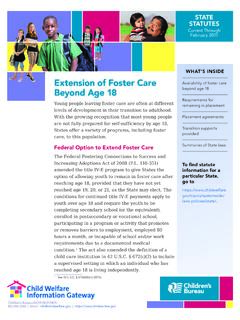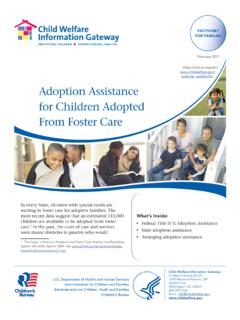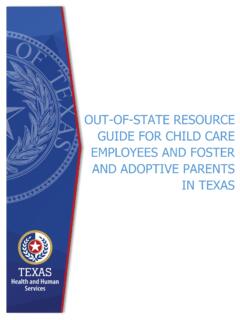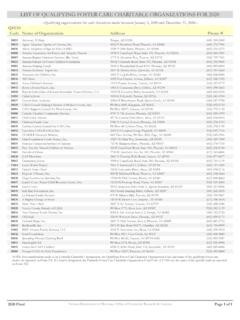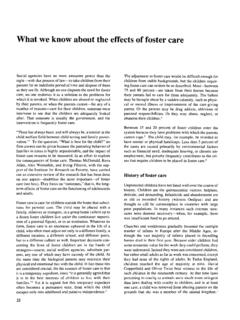Transcription of DEPARTMENT OF THE TREASURY INTERNAL REVENUE SERVICE
1 DEPARTMENT OF THE TREASURYINTERNAL REVENUE SERVICEWASHINGTON, 20224 June 28 1999CC:EBEO:Br4 WTA-N-106593-99 Number: 199934018 Release Date: 8/27/1999 UILC: REVENUE SERVICE NATIONAL OFFICE CHIEF COUNSEL ADVICEMEMORANDUM FOR: FROM:Assistant Chief Counsel(Employee Benefits and Exempt Organizations) SUBJECT:Earned Income Credit and Foster care PaymentsThis is in response to your memorandum dated March 29, 1999, about thetreatment of foster care payments for purposes of the earned income credit (EIC).ISSUE: Are foster care payments considered earned income for purposes of theearned income credit (EIC)?
2 CONCLUSION: Foster care payments that are excluded from gross income under section131 of the INTERNAL REVENUE Code are not earned income for purposes of the EIC. Foster care payments that are included in gross income may be earned income forpurposes of the EIC, depending on the :While not providing a specific fact situation, you referenced language inPublication 17 outlining the circumstances under which foster care payments aretreated as taxable or nontaxable income. The language in Pub. 17 is based onsection 131 of the Code. Our response addresses foster care payments that areexcluded from gross income under section 131 and provides a framework for2 WTA-N-106593-99determining whether payments that do not meet the requirements of section 131are earned AND ANALYSIS:Section 32 of the Code provides that certain taxpayers are entitled to anearned income credit (EIC).
3 The amount of the EIC is based, in part, on thetaxpayer s earned income. Section 32(c)(2)(A)(i) defines "earned income" as wages, salaries, tips, andother employee compensation, plus the amount of the taxpayer s net earnings fromself-employment for the taxable year (within the meaning of section 1402(a)), butthe net earnings shall be determined with regard to the deduction allowed to thetaxpayer by section 164(f). Net earnings from self-employment is the grossincome derived by an individual from any trade or business carried on by theindividual, less deductions attributable to the trade or business, and certainadjustments specified by 131 of the Code excludes qualified foster care payments fromgross income. Section 131(b)(1) defines a qualified foster care payment, in part,as any amount (A) which is paid by a state or political subdivision thereof or by aplacement agency which is described in section 501(c)(3) and exempt from taxunder section 501(a), and (B) which is (i) paid to the foster care provider for caringfor a qualified foster individual in the foster care provider s home, or (ii) a difficultyof care payment, as defined in section 131(c).
4 Section 131 of the Code also limitsthe exclusion based on the age and the number of individuals for whom foster careis provided. Thus, in order for foster care payments to constitute earned income for EICpurposes, the payments must either be an employee s wages, salaries, tips, orother compensation, or be a self-employed individual s net earnings from determine whether foster care providers are employees or self-employed,one must examine the common law rules, which are explained in (d)-1(c) of the Employment Tax Regulations. An employer-employeerelationship exists when the person for whom services are performed has the rightto control and direct the individual who performs the services, not only as to theresult to be accomplished by the work, but also as to the details and means bywhich that result is there may be situations where a foster care provider is an employee ofthe placement agency, we believe this would be unlikely.
5 It is much more likely thatthe foster care provider is either providing foster care gratuitously (not for profit) to3 WTA-N-106593-991 If the amount of the foster care payment is calculated to reimburse only theamount of expenses incurred by the foster care provider in caring for the foster child, itseems likely that the foster care provider is providing gratuitous services to theplacement agency rather than being in a trade or placement agency or is self-employed in the trade or business of providingfoster care . For purposes of this memorandum, therefore, we are assuming thefoster care provider is not an employee of the placement we are assuming the foster care provider is not an employee, thefoster care payments can only be earned income if they are net earnings from self-employment. This, in turn, can occur only if the payments are included in the fostercare provider s gross income.
6 Thus, if the foster care payments are excluded fromgross income under section 131 of the Code, the payments would not be earnedincome for purposes of the the foster care payments are not excluded from gross income, then, in thecase of a foster care provider who is providing gratuitous services1 to the placementagency, the payments would not be earned income because the foster careprovider would not have net-earnings from self-employment. In the case of a fostercare provider who is engaged in the trade or business of providing foster care , thepayments would be gross income derived from a trade or business. This amountwould be used to compute the net-earnings from self-employment, if any. Any netearnings from self-employment, determined with regard to the section 164(f)deduction, would be earned income for purposes of the you have any further questions, please call (202) Chief Counsel(Employee Benefits and ExemptOrganizations)By:MARK SCHWIMMERB ranch ChiefCC:EBEO:Br:4










